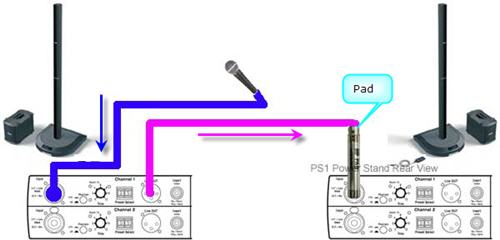Difference between revisions of "PS1 Powerstand / Daisy Chain"
m (formatting) |
m |
||
| Line 15: | Line 15: | ||
Arrows indicate the direction the signal is flowing. | Arrows indicate the direction the signal is flowing. | ||
| − | * | + | * Position the two {{L1}}s '''at least 20 feet apart''' to avoid the possibility of odd phase effects in the audience. More detail: [[Phase Cancellation]] |
* [[PS1 Powerstand Connections/Interactive|Close up view of the Input Panel]] | * [[PS1 Powerstand Connections/Interactive|Close up view of the Input Panel]] | ||
Revision as of 20:18, 19 November 2006
On the relatively rare occasion where you might need to connect the output from one PS1 Power Stand (Classic) / Model I to another PS1 Power Stand (Classic) / Model I:
You can
- Run your mic into the first L1™ PS1 Powerstand (let's say - Channel 1).
- In Channel 1 insert an XLR cable from the Channel 1 Line Out
- At the other end of the cable connect a Pad. The people-at-Bose usually recommend a -20 dBu pad, but some have reported success with -10 dBu
- Connect the Pad to the second PS1 Power Stand (Classic) / Model I Channel 1 or 2.
- On the first PS1 Power Stand (Classic) / Model I, set the input trim appropriately.
- Choose the best preset for your microphone.
- On the second PS1 Power Stand (Classic) / Model I, the input trim should be similar to what you set on the first one.
- On the second PS1 Power Stand (Classic) / Model I, use the same preset as you used for the first one.
Arrows indicate the direction the signal is flowing.
- Position the two L1 s at least 20 feet apart to avoid the possibility of odd phase effects in the audience. More detail: Phase Cancellation
- Close up view of the Input Panel
